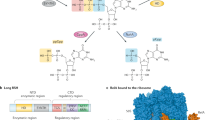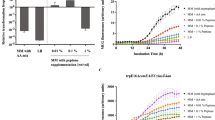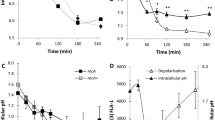Abstract
Wild-type Escherichia coli deprived of a required amino acid shows a stringent response involving various alterations in the cell's normal physiology, including the arrest of net synthesis of stable (ribosomal and transfer) RNA, lipids, phospholipids and peptidoglycans1. The stringent response is found in cells of the Rel+ (stringent) but not Rel− (relaxed) phenotype. The intracellular concentration of guanosine 5′-diphosphate-3′-diphosphate (ppGpp) and guanosine 5′-triphosphate-3′-diphosphate (pppGpp) increases dramatically in amino acid-deprived Rel+ cells due to the enzymatic activity of the relA gene product2, which also stimulates ppGpp synthesis in vitro3. The correlation between stringent response and increase in the intracellular concentration of ppGpp has been interpreted as evidence that this nucleotide has a causal role in stringency1. However, as recent findings show that the correlation does not always hold, ppGpp cannot be considered to act as a unique effector molecule and the idea of a causal role for ppGpp in stringent control has become questionable4,5. Here we describe experiments that cast further doubt on the proposed biological role of this nucleotide, as they show that stringent control can occur in the absence of ppGpp accumulation.
This is a preview of subscription content, access via your institution
Access options
Subscribe to this journal
Receive 51 print issues and online access
$199.00 per year
only $3.90 per issue
Buy this article
- Purchase on Springer Link
- Instant access to full article PDF
Prices may be subject to local taxes which are calculated during checkout
Similar content being viewed by others
References
Gallant, J. A. A. Rev. Genet. 13, 393–415 (1979).
Cashel, M. J. biol. Chem. 244, 3133–3141 (1969).
Haseltine, W. A., Block, R., Gilbert, W. & Weber, K. Nature 238, 381–384 (1972).
Donini, P., Santonastaso, V., Roche, J. & Cozzone, A. J. Molec. Biol. Rep. 4, 15–29 (1978).
Pao, C. C. & Gallant, J. J. biol. Chem. 254, 688–692 (1979).
Martin, R. G. J. mol. Biol. 31, 127–134 (1968).
Stephens, J. C., Artz, S. W. & Ames, B. N. Proc. natn. Acad. Sci. U.S.A. 7, 4389–4393 (1975).
Turnbough, C. L. Jr., Neill, R. J., Landsberg, R. & Ames, B. N. J. biol. Chem. 254, 5111–5119 (1979).
Johnston, M. M., Barnes, W. M., Forrest, G. C., Bossi, L. & Roth, J. R. Proc. natn. Acad. Sci. U.S.A. 77, 508–512 (1980).
Davidon, J. P. & Williams, L. S. Biochem. biophys. Res. Commun. 88, 682–687 (1979).
Donini, P. J. molec. Biol. 72, 553–569 (1972).
Pedersen, S. in Control of Ribosome Synthesis (eds Kjeldgaard, N. C. & Maaloe, O.) 345–352 (Academic, New York, 1976).
Author information
Authors and Affiliations
Rights and permissions
About this article
Cite this article
Spadaro, A., Spena, A., Santonastaso, V. et al. Stringency without ppGpp accumulation. Nature 291, 256–258 (1981). https://doi.org/10.1038/291256a0
Received:
Accepted:
Issue Date:
DOI: https://doi.org/10.1038/291256a0
This article is cited by
-
Basal ppGpp level adjustment shown by new spoT mutants affect steady state growth rates and rrnA ribosomal promoter regulation in Escherichia coli
Molecular and General Genetics MGG (1988)
-
Specific mistranslation in hisT mutants of Escherichia coli
Molecular and General Genetics MGG (1982)
Comments
By submitting a comment you agree to abide by our Terms and Community Guidelines. If you find something abusive or that does not comply with our terms or guidelines please flag it as inappropriate.



